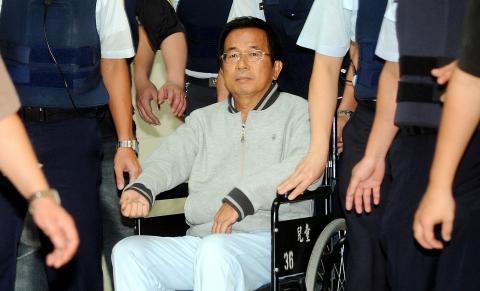The two tumors that had been detected in former president Chen Shui-bian’s (陳水扁) seminal vesicle earlier this year are nonmalignant blood clots, doctors said yesterday after Chen underwent a follow-up medical checkup, adding that they were trying to determine why a third clot had formed.
Chen was granted temporary release from prison so he could get a medical checkup at Chang Gung Hospital’s branch in Linkou District (林口), New Taipei City (新北市), yesterday morning. He was transported from Taipei Prison to the hospital at about 6am.
A group of the former president’s supporters were gathered outside the hospital to show their backing for Chen, shouting “A-bian is innocent” when they saw him arrive.

Photo: Lin Cheng-kung, Taipei Times
National Taiwan University Hospital’s Ko Wen-che (柯文哲), who was asked by Chen’s family to oversee the medical checkup, said a CT scan had shown that Chen’s cardiovascular system was somewhat clogged, but that the condition was not life-threatening.
Ko added that the three clots found in Chen’s seminal vesicle were not malignant. He said the former president was relieved to know that he did not have cancer.
However, doctors were still trying to determine why a third clot had developed so quickly after two were found during checkups last month.
Kuo Cheng-deng (郭正典), another doctor appointed by Chen’s family to perform the checkup, said Chen may have have been lying in a prone position while writing in his small cell for extended periods of time, which appeared to have damaged his knees.
Chen also suffered from gastroesophageal reflux disease and his cholesterol reading is high, doctors said.
He underwent an angiogram at Taoyuan General Hospital in March after complaining of discomfort in his chest.
To resolve those problems, Kuo said, Chen needs a better living environment.
Chen was returned to the prison at 12:50pm.
The Ministry of Justice said Chen underwent an electrocardiogram, CT, MRI, echocardiogram and other checkups.
The former president’s son, Chen Chih-chung (陳致中), appealed to the authorities to grant his father leave from prison to receive further medical treatment.
Chen Chih-chung expressed the hope that his father’s health problems could finally be correctly diagnosed and properly treated because they have persisted for months, leaving the family very anxious.
Various groups in Taiwan and the US have called on the government to release the former president on humanitarian grounds, saying the conditions in prison are contributing to his failing health.
The Ministry of Justice maintains that Chen Shui-bian’s conditions are the same as those of other inmates.
Chen Shui-bian is serving a 17-and-a-half-year prison term on corruption charges.
Additional reporting by CNA and staff writer

MAKING WAVES: China’s maritime militia could become a nontraditional threat in war, clogging up shipping lanes to prevent US or Japanese intervention, a report said About 1,900 Chinese ships flying flags of convenience and fishing vessels that participated in China’s military exercises around Taiwan last month and in January last year have been listed for monitoring, Coast Guard Administration (CGA) Deputy Director-General Hsieh Ching-chin (謝慶欽) said yesterday. Following amendments to the Commercial Port Act (商港法) and the Law of Ships (船舶法) last month, the CGA can designate possible berthing areas or deny ports of call for vessels suspected of loitering around areas where undersea cables can be accessed, Oceans Affairs Council Minister Kuan Bi-ling (管碧玲) said. The list of suspected ships, originally 300, had risen to about

DAREDEVIL: Honnold said it had always been a dream of his to climb Taipei 101, while a Netflix producer said the skyscraper was ‘a real icon of this country’ US climber Alex Honnold yesterday took on Taiwan’s tallest building, becoming the first person to scale Taipei 101 without a rope, harness or safety net. Hundreds of spectators gathered at the base of the 101-story skyscraper to watch Honnold, 40, embark on his daredevil feat, which was also broadcast live on Netflix. Dressed in a red T-shirt and yellow custom-made climbing shoes, Honnold swiftly moved up the southeast face of the glass and steel building. At one point, he stepped onto a platform midway up to wave down at fans and onlookers who were taking photos. People watching from inside

Japan’s strategic alliance with the US would collapse if Tokyo were to turn away from a conflict in Taiwan, Japanese Prime Minister Sanae Takaichi said yesterday, but distanced herself from previous comments that suggested a possible military response in such an event. Takaichi expressed her latest views on a nationally broadcast TV program late on Monday, where an opposition party leader criticized her for igniting tensions with China with the earlier remarks. Ties between Japan and China have sunk to the worst level in years after Takaichi said in November that a hypothetical Chinese attack on Taiwan could bring about a Japanese

STREAMLINED: The dedicated funding would allow the US to transfer equipment to Taiwan when needed and order upgraded replacements for stockpiles, a source said The US House of Representatives on Thursday passed a defense appropriations bill totaling US$838.7 billion, of which US$1 billion is to be allocated to reinforcing security cooperation with Taiwan and US$150 million to replace defense articles provided to the nation. These are part of the Consolidated Appropriation Act, which the US House yesterday passed with 341 votes in favor and 88 against. The act must be passed by the US Senate before Friday next week to avoid another government shutdown. The US House Committee on Appropriations on Monday unveiled the act, saying that it allocates US$1 billion for the Taiwan Security Cooperation Initiative